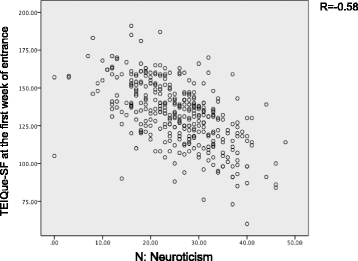Associations between emotional intelligence, empathy and personality in Japanese medical students
- PMID: 29587725
- PMCID: PMC5870303
- DOI: 10.1186/s12909-018-1165-7
Associations between emotional intelligence, empathy and personality in Japanese medical students
Abstract
Background: It is known that empathic communication is important for physicians to achieve higher patient satisfaction and health outcomes. Emotional intelligence (EI), empathy and personality in medical students predict students' individual disposition and their emotional and empathic perceptions. This study aimed to investigate: 1) The association between empathy, EI and personality, and 2) Gender differences in the association between empathy, EI and personality.
Method: Participants were 357 1st year medical students from 2008 to 2011 at one medical school in Japan. Students completed self-report questionnaires comprising three validated instruments measuring EI: Trait Emotional Intelligence Questionnaire-Short Form (TEIQue-SF), empathy: Jefferson Scale of Physician Empathy- student version (JSPE) and personality: NEO-Five-Factor Inventory (NEO-FFI), which explores 5 dimensions of personality Neuroticism (N), Extraversion (E), Openness to experience (O), Agreeableness (A), and Conscientiousness (C).
Results: Pearson Correlations showed weak association between TEIQue-SF and JSPE. TEIQue-SF and NEO-FFI showed positive correlation for E and C, and strong negative correlation for N and weak positive correlation for A and O. Weak positive correlation between JSPE and the NEO-FFI were observed for E and A. Although effect sizes were small, N, A and empathy were significantly higher in females (unpaired t-test). However, hierarchical multiple-regression analysis when controlling for gender and personality showed no association between EI, empathy and gender. A, TEIQue-SF and N were found to make small contributions in respect of predictions for JSPE. Personality contributed significantly to the prediction of TEIQue-SF. N had the largest independent negative contribution (β = - 0,38).
Conclusion: In our study population of 1st year medical students, females had significantly higher N, A and empathy scores than males. Medical students' N score was strongly negatively associated with EI. Empathy was weakly associated with EI and A. However, when controlling gender and personality in regression analysis, gender did not affect EI and empathy, rather personality is the most important factor. Our findings indicate that N is a major factor that negatively affects EI. It is important to mitigate N using thoughtful training, taking into account students' personalities, to reduce N. In future studies, we will assess how communication trainings for students might enhance EI.
Keywords: Emotional intelligence; Empathy; Medical student; Personality.
Conflict of interest statement
Ethics approval and consent to participate
Ethical approval was granted by Gifu University School of Medicine Ethics Committee.
Anonymity and confidentiality for students were guaranteed. Consent of participate was assumed from the completion of the survey.
Competing interests
The authors declare that they have no competing interests.
Publisher’s Note
Springer Nature remains neutral with regard to jurisdictional claims in published maps and institutional affiliations.
Figures
References
-
- Thomas DH. Physician behaviors that predict patient trust. J Fam Pract. 2001;50(4):323–328. - PubMed
MeSH terms
LinkOut - more resources
Full Text Sources
Other Literature Sources
Medical


